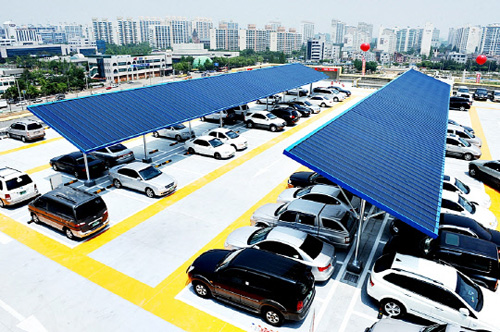Solar light expansion policy to quick braking due to ‘election rock’…Business cancellation to speed up nationwide
Ye Jin Soo | jinye@ | 2018-01-08 10:47:10

According to the energy industry on January 7, one of the biggest obstacles to the expansion of the solar power business is the difficulty in resolving the city, county, and county civil complaints due to the "segregation" of local elections, It is analysis that it is thing. In addition to poor solar location conditions with narrow land area and 70% of production area, there is a concern about the erosion of agricultural land in the construction and operation process, the problem of complaints and licenses overlap, and the implementation plan of `renewable energy 3020`
One solar operator pointed out, "In some areas of Chungcheong province, the solar power business is outdated due to the regulation of 100 ~ 200m distance distance through the permission of the development activity permit, and there are cases where the business is abandoned." In the local elections and that some of the municipalities with the opposition leader who opposes the energy conversion policy are unlikely to pursue new businesses. " Other small-scale power generation companies also said, "The 3020 renewable energy plan has addressed the issue of `separation distance regulation`, easing regulations on entry roads, easing the criteria for development permits, etc." Profit-sharing schemes Local governments are likely to swing in demand for excessive profits from their residents, and additional burdens may be detrimental to business performance. "
A solar power plant operator who planned large-scale investment in Jeonnam coastal area after announcement of government`s renewed energy 3020 plan recently gave up buying land because of distance problem. He delayed plans to invest additional solar power in the second half of the local elections. The prospective operator B, who was planning to build a 100kW solar power plant on the road side of Chungnam area last year, had to abolish the solar power plant contract because of the sudden introduction of restrictions on the separation distance in the last year of local elections.
A representative of company C, who is promoting wind power generation business, said, "Wind power generation business is in a state of pace for many years against local residents who are concerned about noise. I am worried that civil affairs will be further increased ahead of local elections next year." National Assembly Industrial and Commercial Resources Small and Medium-sized Venture Business Committee Free Korean National Assembly member Yoon Han-Hong analyzed the data submitted by the Ministry of Commerce, Industry and Energy and 17 of the nation`s provinces. As a result, there were 579 civil complaints related to permission / It was counted as reaching.
Initially, the government was planning to revise the Ministry of Land, Transport and Maritime Law, which is the parent company of the development activity permitting directive when drafting the 3020 plan for renewable energy, but this was not reflected.
It was reported that if the law was strongly pushed through the amendment of the law, there could be adverse reactions such as opposition of the local governments claiming decentralization and resentment. The planning and location system led by local governments is not yet on track because of the lack of dedicated personnel.
Meanwhile, small-scale power generation companies are complaining that they are facing 3-used because they are not satisfied with the gap of distance, and they are suffering from the supply shortage of middle and large batteries for solar energy storage system (ESS) The National Association of Photovoltaic Power Generators has recently issued a statement stating that it will allow reintroduction of the FIT for less than 100kW. Currently, six companies are obliged to purchase only the solar power of less than 100kW for cooperatives and farmers and 30kW for individual businesses, which are included in the `Renewable Energy 3020` implementation plan. Only small businesses under 30kW will be supported, and solar PV operators operating in the 50-100kW power generation business will be excluded from the support.
By Ye Jin Soo jinye@
